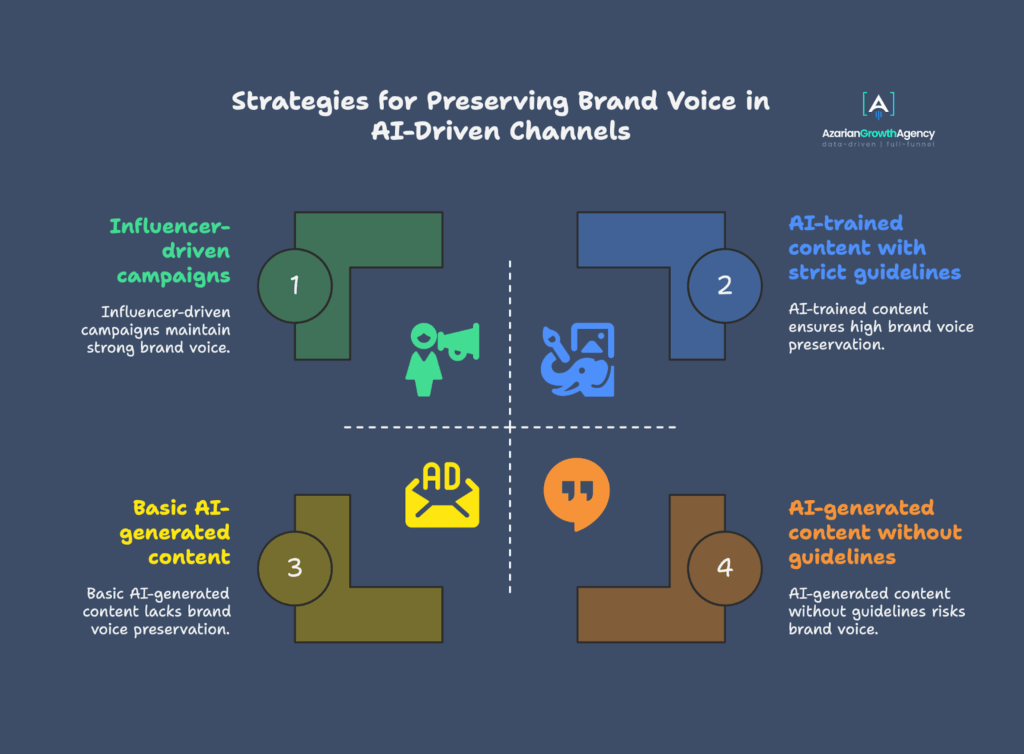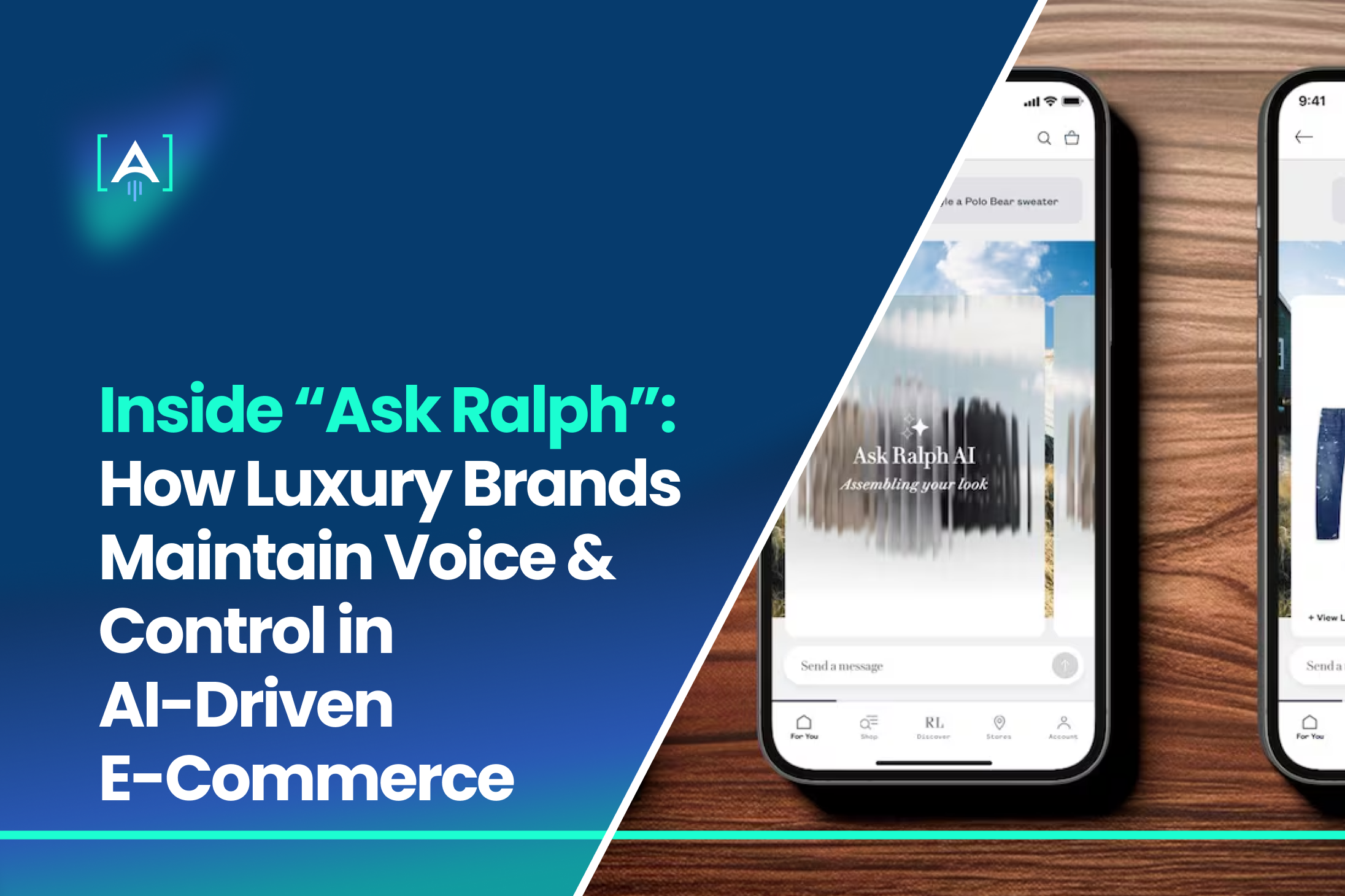AI e-commerce is reshaping how luxury brands sell and engage with customers. It creates opportunities for growth while presenting challenges in maintaining brand voice.
Luxury brands must balance personalization, automation, and brand identity to thrive in this AI-driven landscape.
Leading Fashion Digital Marketing Agencies grow and boost luxury brands through AI-powered platforms.
As a CEO or a business owner, you have to maintain consistency while leveraging fashion marketing, fashion branding, and fashion e-commerce strategies.
AI e-commerce is not just about technology; it’s about creating experiences. Consumers expect personalized recommendations, smooth checkout processes, and engaging content that reflects the brand’s unique voice. Brands that fail to manage this risk lose customer trust and loyalty.
Beyond sales, AI e-commerce provides insights into customer behavior, allowing brands to tailor campaigns more effectively. Luxury brands can identify trends, optimize pricing, and plan fashion campaigns that resonate with the audience.
Join our webinar to see how Azarian Growth Agency helps luxury brands master AI e-commerce without losing their identity.
You’ll learn actionable strategies for fashion campaigns, influencer alignment, and SEO optimization.
Continue reading to find out more about how AI can shift your fashion business forever.
Understanding AI E-Commerce in the Luxury Fashion Industry
AI e-commerce combines artificial intelligence with online retail. It allows luxury brands to offer personalized shopping experiences, automate content, and optimize marketing campaigns.
Brands are using AI e-commerce tools to:
- Deliver personalized recommendations based on browsing and purchase history
- Analyze trends for fashion campaigns and product development
- Enhance visual experiences with virtual fitting rooms, AR try-ons, and style quizzes
- Automate customer service through intelligent chatbots
- Track consumer engagement to refine fashion marketing strategies
Luxury brands integrating AI e-commerce see measurable results. For example:
- Gucci uses predictive analytics to tailor recommendations and anticipate trends, increasing online conversion rates
- Burberry leverages AI for dynamic, cross-platform digital campaigns that enhance customer loyalty
- Prada employs AI chatbots to provide instant, global customer support, improving satisfaction metrics
Other innovative applications include AI-driven visual search, where consumers upload images to find similar products, and AI-assisted trend forecasting for upcoming fashion campaigns. These tools not only save time but also provide creative inspiration for designers and marketers.
AI amplifies creativity instead of replacing it. Brands can scale while maintaining the distinctive identity that defines luxury.
AI e-commerce also integrates seamlessly with fashion marketing and fashion branding strategies, allowing campaigns to resonate with audiences while driving sales.
Preserving Brand Voice in AI-Driven Channels
AI content generation is fast, but it can be risky for brand identity. Automated product descriptions, emails, or social media posts may lose the distinct tone that luxury customers expect.
Luxury brands need strategies to maintain their voice:

- Implement strict fashion branding guidelines for all AI-generated content
- Use fashion advertising frameworks to keep messaging consistent across channels
- Collaborate with fashion influencers to humanize campaigns and preserve authenticity
- Train AI tools using previous high-performing content to replicate brand tone
Marketing Agencies ensure that every AI touchpoint aligns with the brand’s identity. For example, an influencer may interpret a product’s story differently from AI, but combining the two creates a consistent and authentic experience.
Brands also monitor AI outputs in real time. Analytics help identify content that diverges from the brand voice, allowing adjustments before campaigns reach customers. This ensures that all the automated processes complement one another rather than conflict with the brand’s messaging.
Successful brands often use AI to generate drafts, then apply human editing to maintain their signature voice. This hybrid approach allows luxury brands to scale content without losing authenticity.
Integrating AI Without Losing Creative Control
AI tools offer valuable insights for fashion marketing and fashion campaigns, but human oversight is critical. Luxury brands must retain creative control while leveraging AI efficiency.
Key strategies include:
- AI-assisted content calendars: Plan campaigns in advance while ensuring AI suggestions match brand identity
- Influencer alignment: Coordinate AI outputs with fashion influencers to maintain authentic storytelling
- Campaign monitoring: Continuously track performance metrics to refine AI recommendations
- Cross-department collaboration: Integrate AI insights with design, merchandising, and marketing teams to preserve creativity
Luxury brands also integrate AI with design, product launches, and advertising strategies. This ensures that automated processes enhance creative vision rather than replace it.
By combining AI intelligence with human judgment, brands achieve scalable marketing without compromising on quality.
This approach strengthens fashion branding and improves ROI from fashion marketing campaigns.
Fashion SEO in an AI E-Commerce World
AI e-commerce is transforming fashion SEO strategies. Search engines and AI-driven platforms prioritize personalized results, predictive search suggestions, and voice search. Brands must optimize content to remain visible.
Best practices for fashion e-commerce SEO include:
- Optimizing product pages for AI-powered search and recommendations
- Using structured data to clarify content for search engines and AI tools
- Linking fashion campaigns to relevant blog content and landing pages
- Incorporating keywords naturally in descriptions, headings, and alt text
- Tracking zero-click searches to adjust content for better visibility
Brands that master fashion SEO can improve visibility, traffic, and conversions.
Enhancing Customer Experience Through AI Across Channels
AI e-commerce is not limited to online stores. Luxury brands are using AI to create a seamless experience across fashion e-commerce, physical stores, and digital campaigns.
Key strategies include:
- Omnichannel personalization: AI recommends products online and suggests in-store experiences based on previous interactions
- Customer insights: AI analyzes behavior across social media, websites, and in-store visits to guide fashion marketing decisions
- Interactive experiences: Virtual try-ons and AI chatbots extend engagement beyond the website
- Predictive service: AI anticipates customer needs, offering suggestions before they ask
Integrating these strategies strengthens fashion branding and ensures that every touchpoint reflects the brand’s voice. By combining AI insights with human creativity, brands can deliver consistent, high-quality experiences across all channels.
A Fashion Digital Marketing Agency helps brands implement these omnichannel AI strategies, connecting fashion campaigns, influencer efforts, and SEO to maximize engagement and sales.
Case Study: “Ask Ralph” and Luxury Fashion Excellence
“Ask Ralph” is an AI-powered shopping assistant launched by a leading luxury fashion house to improve how customers discover and style products online. Before its rollout, the retailer faced two key challenges:
- Low conversion rates on high-value items because shoppers struggled to visualize complete looks from individual pieces.
- Time-consuming campaign planning, as stylists and marketers manually created outfit recommendations and content.
With “Ask Ralph,” the brand integrated a conversational AI tool into its website and mobile app. Customers could describe an occasion or preferred aesthetic (“elegant evening in Paris,” “modern business casual”), and the assistant instantly recommended curated outfits from the current collection.
It also generated styling tips, pulled relevant imagery, and adapted its tone to match the house’s editorial voice.
While Ralph Lauren hasn’t disclosed Ask Ralph; only KPIs, its broader financial results during the period highlight how digital innovation supported growth:
- Revenue: +13.7% year-over-year
- North America revenue: +7.9%
- Europe revenue: +15.7%
- Comparable store sales: +13%
- Net income: +30.7%
These outcomes suggest that initiatives like “Ask Ralph,” alongside other strategic moves, contributed to higher engagement, stronger online conversions, and operational efficiency.
Lessons for Luxury Brands
- Align AI outputs with branding guidelines: Train models on existing tone, photography standards, and campaign language so recommendations reflect the brand’s prestige.
- Blend AI with influencer authenticity: Use insights from stylists and ambassadors to refine recommendations and keep them aspirational.
- Track performance rigorously: Measure how AI-assisted experiences impact sales, engagement, and brand perception, then fine-tune prompts or datasets.
By combining AI efficiency with human creativity, “Ask Ralph” shows how technology can elevate luxury shopping while staying true to a brand’s identity.
The Future of AI E-Commerce in Fashion Marketing
AI e-commerce continues to evolve. Upcoming trends include:
- Predictive personalization that anticipates consumer preferences
- AI-driven influencer marketing optimization for campaign precision
- Automated fashion campaigns management and content generation
- Integration with AR/VR experiences to further enhance luxury shopping
Business owners and CEOs must stay proactive. Partnering with a Fashion Digital Marketing Agency ensures luxury brands harness AI effectively.
Conclusion
AI e-commerce gives luxury brands the power to engage customers, optimize fashion campaigns, and enhance fashion branding. Without proper oversight, AI can risk diluting brand voice.
Marketing agencies that implement automation tools ensure that AI supports the brand instead of diluting its identity. Brands gain measurable results while preserving the premium customer experience. This is why it’s important to choose an agency that helps brands maintain control while leveraging AI’s potential. If you’re looking for where to find all of these services in one place, then visit our page.

